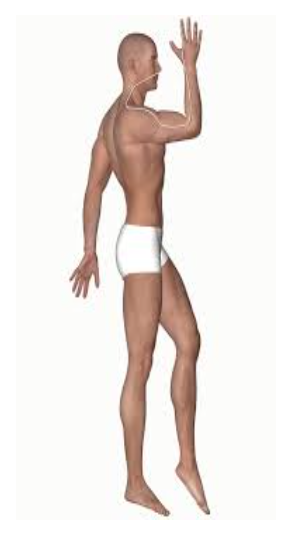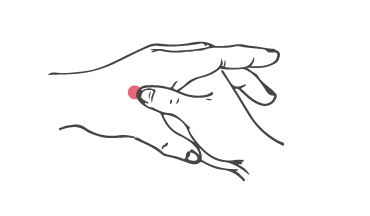Large Intestine – Depression/Excessive Worry
The Large Intestine: The waste from the body is easily and naturally sorted from what needs to be reabsorbed. What is no longer needed is released back into the world. Therefore, the large intestine’s main job is elimination. It receives food from the small intestine and turns liquids into solid waste.
The Meridian: The large intestine energy encourages us to let go and not hold onto things that do not serve us.

Location: The large intestine meridian starts at the outside of the index fingernail. It travels up the top of the arm before crossing to the back of the shoulder. It crosses back over the shoulder, runs up the throat, and ends just below the nose.
Physical Imbalance: abdominal pain, diarrhea, constipation, nasal and sinus problems, skin irritations
Emotional Imbalance: Difficulty in letting go of the past, guilt, grief, emotional stuckness or defensiveness
How to Balance
*When the large intestine meridian is balanced, it promotes the ability to let go of what is unnecessary, both physically and emotionally. Emotions like mental clarity, healthy detachment, and a flexible attitude toward change become more prominent, facilitating a healthy flow of energy and emotional well-being.
Acupoint – acupressure/massage: The are many pressure points in the body. This is one example.
If you are stuck on something, try applying deep pressure with your opposite thumb to see changes.

Herbal Therapy/Diet:
- Maintain regular bowel movements through diet and exercise (and if needed, acupuncture & herbs)
- Eat foods that are warm and easy to digest (temperature is important to the gut). Steam vegetables as opposed to eating them raw (only eat raw in spring and summer).
- Be careful with food combinations: Protein, fat, complex carb at every meal. Protein the size of your palm, carbs the size of your fist, fats the size of your thumb.
- Eat slowly & intentionally. Chew thoroughly.
Meditation/Mind: The brain, stomach, and intestines have a common connection. For example, the thought of eating can release the stomach’s juices before food gets there. And in return, a troubled gut can send signals to the brain. Have you ever felt nauseated before giving a presentation? Below is a five-minute gut healing meditation
- Find a nice, quiet place. Sit however you like. Close your eyes and rest your hands on your lap.
- It’s a good habit to begin your meditative practice by saying a positive affirmation in your head, such as “May this be of benefit.”
- Start by taking a few deep breaths and just observe yourself breathing. Breathe in through your nose and breathe out through your mouth. If you notice your mind already wandering, it’s ok; just gently redirect your mind to the breath without any judgment.
- Make sure you are inflating your belly when you take these deep breaths. Take a breath in through your nose to a count of 4. Hold it in your belly to a count of 7. Breathe it out through your mouth to a count of 8. Do this at least 4 times and no more than 8 times.
- After you have done the 4-7-8 breaths, then go back to taking nice, gentle breaths in through your nose and out through your mouth at a comfortable pace.
- After one minute of doing this, repeat this affirmation for the large intestine meridian. “I gently release what is ready to be transformed into something new.” Repeat 5 times.
- Continue to take deep breaths and give thanks for your large intestine and the role it plays in helping you to let go.
- Bring your attention back to the whole self.
- Slowly open your eyes and bring a smile to your lips.
Physical Exercise: Regular movement can prevent constipation, reduce bloating, and decrease the risk of developing conditions like diverticulitis. Studies have shown that moderate-intensity exercises, such as walking, can significantly improve gut motility and reduce the time it takes for food to pass through the digestive tract. Walking is also low-impact, making it helpful for those who struggle with joint and muscle pain.
Keep Heal’n
<<< Previous article: The Kidney Meridian
>>> Next article: The Small Intestine
Related Articles



